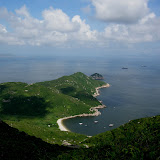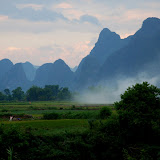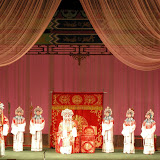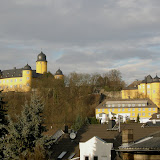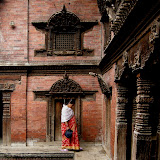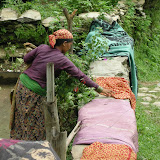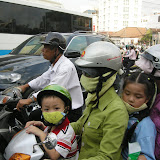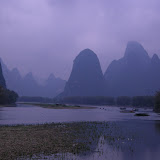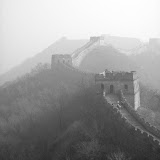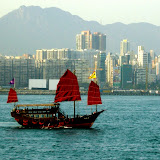好友寄来一张北京三里屯使馆区的照片,让我看看曾经熟悉和钟爱的秋色。是啊,当我想念北京的秋天时,这想念每每化作眼前漫漫的银杏树叶和耳边的低低风吟,还有当年流行的一首歌的歌词“我是一只小小鸟,想要飞,却怎么也飞不高”。连自己那时的样子,也跃然眼前,秋天起风的日子里,常常是一条红格呢裙子,黑色高领羊毛衫,头上包着一块红丝巾, 穿过种满银杏树的巷子,去打大学毕业后的第一份工, 这么多年过去了,我好像还是一只想飞的鸟,那召唤来自飞翔的感觉,不为到哪儿,只为飞。无目的带来自由,所过之处留下想念,这想念有时
Thursday, December 18, 2008
静听风吟 Whispers of the Wind
Saturday, November 22, 2008
还爱吃巧克力么? Still Love Chocolates?
这些天来她的这个问题总在耳畔,二十年前的记忆重现带来无比温暖和浓重的怀旧情绪。看到自己生活中有些曾经重要的东西永远丢在了来时的路上,淡淡的忧伤漫起,好象细雨蒙蒙的天气中飘落的粉红色花瓣。这样的忧伤可以让每个人成为诗人。
那时我十八岁,热爱巧克力,热爱舞蹈,热爱舒婷、北岛、顾城,热爱做一切与复习高
 考无关的事时那种自由痛快的感觉。朋友说我是一个理想主义者,追求完美的人,想想看这是从十八岁时到现在都未丢弃的。人生中的寻觅、丢弃和获得也许就是这样,在不圆满的选择中,执着其实从未改变。
考无关的事时那种自由痛快的感觉。朋友说我是一个理想主义者,追求完美的人,想想看这是从十八岁时到现在都未丢弃的。人生中的寻觅、丢弃和获得也许就是这样,在不圆满的选择中,执着其实从未改变。我的朋友,谢谢你还记得岁月中某一时刻的我,就让她安静的留在那一时刻吧。 不过,今天下班的时候,我给自己买了一板巧克力。
Some days ago, I got reconnected with a close friend from high school days. After a few sentences exchanged on msn, she wrote: “You still love chocolates?” She’s the only one who would have asked such a question. My answer disappointed myself: “Not so much anymore.” It should have been: “As much as before”. A sense of imperfection seized me when I realized the loss of a once strong passion, which should have remained, always.
Her question has lingered in my mind. Memories from twenty years before engulfed me with warmth and nostalgia that felt deep and boundless. I was brought back to see things once so important to me but were eventually lost on the way. Pain fell tenderly, like the pink petals of peach blossom falling in a fine, misty drizzle. The tenderness in such pain creates a poet out of everybody.
I was 18 years old then and loved chocolates. I also loved dancing, Misty Poems and the freedom and joy coming from everything unrelated to reviewing for the university entrance examinations. Friends labeled me as an idealist, in constant pursuit of perfection in life. When I ponder over my life from 18 years old to now, I see that such a pursuit has remained. Perhaps this is how it is in the searching, losing, deserting and gaining in our lives. In seemingly imperfect, unsatisfactory choices we make, certain perseverance has never changed.
My friend, thank you for remembering the girl that I was at certain moment in the passing of months and years. Let her peacefully stay at that moment. Only today after work, I got myself a big piece of chocolate.
Wednesday, November 19, 2008
甲骨 Oracle Bones
 Chinese, to understand better my people and my country in massive social transformations. Stories of ordinary people are told in a very calm and smooth tone. No dramatic climax, but touching and powerful because of the truthfulness in the very detailed observation and narration of individual lives across generations. Ancient and recent history of China is naturally weaved into the present, all relevant in expressing certain characters of Chinese culture and people that have traveled through time and space, withstanding great changes in their living environment. I would put the book on top of the reading list of everybody who is interested in gaining insight into the Chinese society, but tired of the “Doing Business in China” type that are swamping every book shop in Hong Kong.
Chinese, to understand better my people and my country in massive social transformations. Stories of ordinary people are told in a very calm and smooth tone. No dramatic climax, but touching and powerful because of the truthfulness in the very detailed observation and narration of individual lives across generations. Ancient and recent history of China is naturally weaved into the present, all relevant in expressing certain characters of Chinese culture and people that have traveled through time and space, withstanding great changes in their living environment. I would put the book on top of the reading list of everybody who is interested in gaining insight into the Chinese society, but tired of the “Doing Business in China” type that are swamping every book shop in Hong Kong.In the end of the book, Mr. Hessler quoted the Chinese translation of a few lines from Whitman’s Leaves of Grass, and translated them back into English. Interesting to compare these to Whitman’s original. All irresistible lines.
我,痛苦和欢乐的歌手,今世和来世的统一者,
所有的暗示都接受了下来,加以利用,但又飞速的跃过了这些,
歌唱一件往事。
I, the singer of painful and joyous songs, the uniter
Of this life and the next,
Receiving all silent signs, using them all,
But then leaping across them at full speed,
Sing of the past.
(Whitman’s original:
I, chanter of pains and joys, uniter of here and hereafter,
Taking all hints to use them, but swiftly leaping beyond them,
A reminiscence sing. )
Thursday, November 13, 2008
第一支椿 First Pile!
 Yesterday evening a mail came in from an entrepreneur in Vietnam, for whose construction project we have been helping to raise money. The mail says: “Today 12 Nov at 11 am ICT according to the best time and date we drove the first pile. The pile number was #58. The depth was 35 meters.” The simple line struck me with a strong emotion. On an auspicious day, this must be a special moment in life for him, a moment to see his long cherished dream becoming a reality after years of patience, faith and hard work, and perhaps lots of frustration. Looking at the picture in which a small bunch of bright flowers, incenses, fruits, liquor and chickens are set on a wooden table in front of the huge machine, I became emotional as well, overwhelmed by the power of something real. That’s totally different from all the budgets, plans, financial projections in excel sheets. To the Power of something simple but real, cheers!
Yesterday evening a mail came in from an entrepreneur in Vietnam, for whose construction project we have been helping to raise money. The mail says: “Today 12 Nov at 11 am ICT according to the best time and date we drove the first pile. The pile number was #58. The depth was 35 meters.” The simple line struck me with a strong emotion. On an auspicious day, this must be a special moment in life for him, a moment to see his long cherished dream becoming a reality after years of patience, faith and hard work, and perhaps lots of frustration. Looking at the picture in which a small bunch of bright flowers, incenses, fruits, liquor and chickens are set on a wooden table in front of the huge machine, I became emotional as well, overwhelmed by the power of something real. That’s totally different from all the budgets, plans, financial projections in excel sheets. To the Power of something simple but real, cheers!Friday, November 07, 2008
Friday, October 31, 2008
Monday, October 27, 2008
今夏最后的姜花 Last Ginger Flower of This Summer

秋天来了,姜花的季节也要过了。再放一把在窗前吧。我喜欢生活中这些交替的周而复始的变化,让你在任何一个季节总有些什么可以盼望的,即使在香港,也是如此。
Some years later and somewhere in the world, if I happen to reminiscing about my home today and about the Lamma Island, then wafted with the memory must be the scent of ginger flowers. Its delicate and sweet scent always feels refreshing when you walk in the summer fields. And On days when you are able to rise a bit early and have time to take a stroll along the Yung Shue Wan Main Street, you often have a chance to buy a bunch full of buds for HK$10 from a woman who just cut them from the field, and when you return in the deepending dusk, open your door, waiting for you is a full house of such delicate sweetness.
Autumn is on the way, and the seaon of ginger flowers will soon pass. Let me place another bunch in front of our window. I adore the cycles in life, the feeling of things leaving and returning, disappearing and emerging again and again, like the change of seasons. It gives you something to look forward to in any season, on any day, even in Hong Kong.
Friday, October 17, 2008
清晨的收获 Morning Harvest

Wednesday, October 15, 2008
梦见蝴蝶 I Dreamed of A Butterfly
 一个方正的西式石亭。忽然一只巨大的黑色蝴蝶从身后飞来,先是恍惚的影子,然后就清晰的看见它翅膀上鲜艳的橙色斑点。这蝴蝶落在我的右臂上,安安静静地不走了,我看到它的眼睛望着我。我开始移动脚步离开这个废墟,它仍停在我的右臂上。这时不知从哪里冒一个又黑又瘦的小老头儿,问我:“这是哪一种花精啊?”我开始感到恐惧,用力把蝴蝶甩到地上,它落在草上,却也不飞走…
一个方正的西式石亭。忽然一只巨大的黑色蝴蝶从身后飞来,先是恍惚的影子,然后就清晰的看见它翅膀上鲜艳的橙色斑点。这蝴蝶落在我的右臂上,安安静静地不走了,我看到它的眼睛望着我。我开始移动脚步离开这个废墟,它仍停在我的右臂上。这时不知从哪里冒一个又黑又瘦的小老头儿,问我:“这是哪一种花精啊?”我开始感到恐惧,用力把蝴蝶甩到地上,它落在草上,却也不飞走…这时醒了,外面正下着大雨,醒的那一瞬间想着也许这只蝴蝶受了伤, 飞不动了,我为什么没有带它回家,喂它直到好了可以再飞?蝴蝶是吃什么的?…
梦究竟是什么呢? 有些梦会走出黑夜的暗影, 比某些发生过的事还真实,让你在清晰的光线中, 带着一丝困惑,不停回味。
By now I was awake. The rain was pouring outside. For an instant, I worried that the butterfly got injured and could not fly any more. Why didn’t I bring it home, take care of it until it flies again? What does a butterfly feed on? …
What on earth is a dream? Some dreams break out of the darkness of night, appear more real than anything that has truly taken place, and push you into a bewilderment that lingers into the broad daylight and refuses to clear up.
Thursday, October 09, 2008
Calorie count on the Menu
Today I read that California became the first American state to require restaurants to display the calorie count of each item on the menu, starting in 2011. This is absurd. Why cannot people simply live by common sense, not by numbers? It is exactly in California where I saw the most calorie conscious people examining labels on everything they put into their shopping carts, yet everyone came to the cashier with carts of foods that can easily reduce the world’s starvation by half. Perhaps it is also the US invention to use “unbiased” terms to refer to fat people as “gravity challenged” or “large and in charge”. What humiliation! I wonder what happened in this world to make us unable to live by the basic rules and principles with which human race has survived for thousands of years.
Below I quote somebody’s obituary to Common Sense.
'Today we mourn the passing of a beloved old friend, Common Sense, who has been with us for many years. No one knows for sure how old he was, since his birth records were long ago lost in bureaucratic red tape. He will be remembered as having cultivated such valuable lessons as:
Knowing when to come in out of the rain; why the early bird gets the worm; Life isn't always fair; and maybe it was my fault.
Common Sense lived by simple, sound financial policies (don't spend more than you can earn) and reliable strategies (adults, not children, are in charge).
His health began to deteriorate rapidly when well-intentioned but overbearing regulations were set in place. Reports of a 6-year-old boy charged with sexual harassment for kissing a classmate; teens suspended from school for using mouthwash after lunch; and a teacher fired for reprimanding an unruly student, only worsened his condition.
Common Sense lost ground when parents attacked teachers for doing the job that they themselves had failed to do in disciplining their unruly children.
Common Sense declined even further when schools were required to get parental consent to administer sun lotion or an Aspirin to a student; but could not inform parents when a student became pregnant and wanted to have an abortion.
Common Sense lost the will to live as the churches became businesses; and criminals received better treatment than their victims.
Common Sense took a beating when you couldn't defend yourself from a burglar in your own home and the burglar could sue you for assault.
Common Sense finally gave up the will to live, after a woman failed to realize that a steaming cup of coffee was hot. She spilled a little in her lap, and was promptly awarded a huge settlement.
Common Sense was preceded in death, by his parents, Truth and Trust, his wife, Discretion, his daughter, Responsibility and his son, Reason. He is survived by his 4 stepbrothers:
I Know My Rights
I Want It Now
Someone Else Is To Blame
I'm A Victim
Not many attended his funeral because so few realized he was gone. If you still remember him, pass this on. If not, join the majority and do nothing ."
Wednesday, August 13, 2008
灵山 Soul Mountain
我想去哪里?我在寻觅什么? 在诺贝尔文学奖得主高行健的小说《灵山》中,主人公走在中国西南寻找一个传说中叫灵山的地方。书快结束的时候,他越过了一
 条河,觉得离目的地很近了,问路上的一位长者,长者却说:“灵山在河对岸,你越走越远了。” 主人公困惑地问:“我刚从对岸过来啊,如果我从对岸定方向呢?”“还是在河对岸。”长者答。最后,主人公并未到达灵山,而那对他或对我(作为一个读者)都不再重要了。
条河,觉得离目的地很近了,问路上的一位长者,长者却说:“灵山在河对岸,你越走越远了。” 主人公困惑地问:“我刚从对岸过来啊,如果我从对岸定方向呢?”“还是在河对岸。”长者答。最后,主人公并未到达灵山,而那对他或对我(作为一个读者)都不再重要了。《灵山》并不是一个故事,而是“我”、“你”、“他”,有时也有“她”的一个旅程,有中国古代、现代的历史,民间传说,叙述者童年的回忆,和旅途中邂逅的种种人物。作者试图在一个极其广阔的文化背景中描述人存在中的一个两难困境:人从独处中获得绝对独立的冲动与从人群中找寻温暖的渴望之间的矛盾。而丰富生命的友情可以威胁个体的完整,无一例外的会在力量的挣扎角逐里告终。
这本书是当代文学的一部罕见作品。我相信它帮助我向生命的真谛又迈进了一步。
 er realized that it can be so beautiful. Like a wayfarer, I seem to be consistently on the move toward the next destination, or always prepared to.
er realized that it can be so beautiful. Like a wayfarer, I seem to be consistently on the move toward the next destination, or always prepared to.Where do I want to go? What do I search for? In Soul Mountain, a novel written by Gao Xingjian, a winner of the Nobel prize for literature, the narrator travels through southern and south-western China to search for a legendary place called “Ling Shan (Soul Mountain)”. In the last part of the book, he crossed a river, felt very close to Ling Shan and asked an old man for its location. The old man said “it was on the other side of the river. You are moving farther and farther away.” The narrator got confused and asked: “I’ve already come to this side of the river. What if I use that side to get my bearings?” The old man replied “it’s still on the other side of the river”. In the end, the protagonist did not reach Soul Mountain, but for him and for me as a reader, it appears no longer important.
Soul Mountain is not one story, but a journey of “I”, “You” and “He” and sometimes a “She”, and a collection of ancient and modern Chinese histories, childhood reminiscences, folk tales, and all kinds of people and wanderers encountered on the way. Among many other things, the author tried to deal with “an existential dilemma: man's urge to find the absolute independence granted by solitude conflicts with a longing for the warmth and fellowship which can be given by "the other," be it he or she. At the same time, however, this enriching companionship threatens the individual's integrity and, without fail, ends in some kind of struggle for power.”
This book is a rare work in modern literature. I feel that its transforming power has brought me a step closer to the truth of life. Not an easy one to read, but I recommend it. If possible, read it in Chinese.
Thursday, August 07, 2008
In Ho Chi Minh City Again
Never before in a hyper inflationary environment, I was struck by it right after landing. The taxi driver asked for 250,000 Dong to take me to the hotel. Four months ago, I paid 100,000 for the same. Hard feelings developed. The s
 mile on the driver’s face looked tricky and wicked. I felt I was being ripped off by the inflation but more by people who decided to take advantage of it.
mile on the driver’s face looked tricky and wicked. I felt I was being ripped off by the inflation but more by people who decided to take advantage of it.They put me in the same room that I stayed in last time, overlooking the Saigon River. It was a soothing view in the darkness. Local English newspaper reported domestic retailers facing the onslaught of international competitors as Vietnam fulfils its promised time-table to open up when entering WTO. A few years ago, this was exactly the language in the Chinese media. China was “feeling the stones to step upon to cross the river”. Its experience may have built a bridge for others who also want to make the cross.
When the sun rose and I merged into the hustle and bustle on the street again, Ho Chi Minh City again became young, friendly, and interesting. I was most amazed by the order people find under a very chaotic surface, especially when Nhung, my Vietnamese colleague, took me on the backseat of her motorbike through traffic from all directions. I thought I would be scared, but I was not, feeling safe and stable instead. It is obviously also a strength of a Chinese to find order in chaos.
At dinner table, without noticing it, I started some efforts to pick up Vietnamese words. The first word was “NGH N”, meaning “thousand”, because it was the smallest local note in my wallet.
Thursday, July 24, 2008
从高处看世界 A View from the Sky
7月21日傍晚,在中国的广西阳朔, 我平生第一次乘上了热气球。刚刚下过雨,太阳光温
 暖地照向连绵的喀斯特群山 。气球在空气中平稳的徐行,比平静的水面上航行的船只还平稳。在我眼前展现的景象很难言表,却让我心中同时充满安宁与激荡。 这时有一只小手紧紧攥着我的手,试图在每次火焰喷射时得到一点庇护;我回转头时,也有一双微笑的眼睛望着我,我明白身边有另一个心灵正看着和体会着和我一样的东西。
暖地照向连绵的喀斯特群山 。气球在空气中平稳的徐行,比平静的水面上航行的船只还平稳。在我眼前展现的景象很难言表,却让我心中同时充满安宁与激荡。 这时有一只小手紧紧攥着我的手,试图在每次火焰喷射时得到一点庇护;我回转头时,也有一双微笑的眼睛望着我,我明白身边有另一个心灵正看着和体会着和我一样的东西。从高出和远处看世界,它会呈现全然不同的景象。这一点我希望我总会记得 。
(阳朔的照片在 “透过我的镜头”中的 “阳朔的夏天”相簿。)
For the first time in my life, I was on a hot air balloon. It was late afternoon on July 21 in Yangshuo, Guangxi province of China. The rain just stopped, and the sun was shining warmly over a vast landscape of Karst hills. The balloon travelled in the air very smoothly, more smoothly than a boat does in calm water. What extended in front of my eyes could not be fully described with words, but it strangely filled my heart with calmness and excitement as the same time. I had a little hand in mine, grabbing me to seek comfort from the occassional burst of fire to create hot air. As I turned around, I saw smiling eyes looking into mine and learned that another soul was seeing and feeling the same things as I was.
The world looks completely different from above and far. This is something I hope I will always remember.
(Pictures of the beautiful landscape in Yangshuo can be found in the album “Summer in Yangshuo” in the section “Through My Lenses” on this blog.)
Wednesday, June 04, 2008
Saturday, May 31, 2008
化蝶 Metamorphosis
从家向后穿过菜田往南丫岛的深处,经大坪村往山上走,有一段可从高处望海的很美的山径,这是我的 晨径。进入晨径前是一段葱郁的长路,此时野花缤纷。也是在这一段,每年初夏和晚秋,各色蝴蝶飞舞, 亦真亦幻。
晨径。进入晨径前是一段葱郁的长路,此时野花缤纷。也是在这一段,每年初夏和晚秋,各色蝴蝶飞舞, 亦真亦幻。
想起儿子在刚会说整句话后不久,有一天忽然问我: “蝴蝶死了以后就变成花了,是吧?”我笑了,说“是,蝴蝶象花一样美,可它小时候是只小肉虫儿。” 蝴蝶的生命,从沉重变轻盈,从丑陋变美丽,从平庸变灿烂,在我心里始终是个奇迹,好象一个绝不可能的梦想的实现。
中国最著名的有关蝴蝶的故事有两则,一是庄周梦蝶, 二是梁祝化蝶。庄周梦蝶讲的是道家的代表人庄子有一天梦到自己变成了一只蝴蝶,醒了之后感觉梦境中的一切如此真实,他问了一个问题:“我是谁? 我是庄周,梦到了蝴蝶,还是蝴蝶的一个梦, 蝴蝶梦到它变成了庄周?”这个故事中所隐含的哲学思想也可延伸至道家对生与死,现实与梦境等人生命题的阐释。梁祝化蝶是相爱的两个人生前被拆散,死后化作蝴蝶破坟而出,随风自由而舞,永远相依。
蝴蝶是中国人的一个梦境,它是自由, 是美, 是灵魂,是爱情,同时却也是死亡,是脆弱,是女人的虚荣和短暂的欢乐; 它的变形是从肉体到灵魂的解脱,从沉重丑陋的现实生活至美丽轻盈的精神世界的升华。而在传统中国文化中,死亡本身就是一种变形,而不是一个终结。
每每置身于这段蝴蝶纷飞的小径,我都有种伸出手去便触到梦的感觉。有时我想,如果我是一条匍匐而行的虫子,用我的一生做交换可以拥有蝴蝶的一天,我会愿意么?变作蝴蝶的我,还会有虫子的记忆么?
I remember once being asked by my then two-year-old son: “when a butterfly dies, it changes into a flower, right?” I smiled and said: “yes a butterfly is as beautiful as a flower, but when it was young, it was a caterpillar”. To me, the metamorphosis in a butterfly’s life is an impossible dream that comes true.
In China, there are two most well-known butterfly stories – “Zhuangzi’s Butterfly Dream” and “Butterfly Lovers”.
The first one was about a dream of Zhuangzi, the Taoism philosopher who lived more than 2000 years ago in China. One day he dozed off and dreamed that he turned into a butterfly. When he woke up, the joyful feeling of a butterfly was so real, and he wondered who he actually was. Was he Zhuangzi who
 dreamed that he was a butterfly or was he the dream of a butterfly who dreamed it was Zhuangzi? The philosophical proposition implied here also extends to the Taoism view on life and death, reality and dream.
dreamed that he was a butterfly or was he the dream of a butterfly who dreamed it was Zhuangzi? The philosophical proposition implied here also extends to the Taoism view on life and death, reality and dream. The Butterfly Lovers is a legend of the tragic romance between Liang Shanbo and Zhu Yingtai. When their hope of marriage was dashed when Zhu’s parents betrothed Zhu to another man, Liang died of a broken heart. On Zhu’s wedding day, she threw herself against Liang’s tomb. The tomb opened up and enveloped Zhu. Then a pair of butterflies emerged from the tomb and flew high freely and together.
To Chinese, butterflies symbolize freedom, conjugal love, beauty and soul but at the same time death, vulnerability of life, female vanity and transient joy. Its metamorphosis is the extrication from flesh to soul and rise from the heavy, ugly reality to the light and beautiful spiritual world. In traditional Chinese culture, death is anyway not seen as an end, but a metamorphosis into another form of existance.
Every time I walk along the butterfly section before the Morning Trail, I have the feeling that I can raise my hand and touch a dream. A thought often comes to mind. If I were a caterpillar and could exchange my whole life for a day as a butterfly, would I be willing to? When I became a butterfly, would I still carry the memories of a caterpillar?
Wednesday, May 14, 2008
“在泥泞中, 鞭炮声宣告发现了又一具尸体”"Amid the mud, fireworks signal another body"
我记忆中也有一次地震。32年前这场地震从一个中国北方城市中夺走了二十多万生命。我模糊记得在一个初夏拂晓的黑暗中,有多彩的光在窗外,有碎石摇落的声音,床在晃,爸爸叫醒我们从我家所在的大灰楼往外跑。直到那年深冬,我们才回到这个大灰楼里。全大院儿的人都挤到了车库和外面的空地中,每家在这里支起一、两张
 床和蚊帐。我父母后来用各种颜色的塑料布搭起了全大院第一个防震棚,我在周围跑跑跳跳,快乐而自豪。之后一个多月, 妹妹作为一个新生婴儿从医院直接住进了这个塑料的家。 是的, 我用了“快乐”这个词,它的确准确形容了我当时在震后这几个月中作为一个小孩儿的感受 – 无忧无虑,不上学,没人管,尽情游戏,象野猫一样自由……
床和蚊帐。我父母后来用各种颜色的塑料布搭起了全大院第一个防震棚,我在周围跑跑跳跳,快乐而自豪。之后一个多月, 妹妹作为一个新生婴儿从医院直接住进了这个塑料的家。 是的, 我用了“快乐”这个词,它的确准确形容了我当时在震后这几个月中作为一个小孩儿的感受 – 无忧无虑,不上学,没人管,尽情游戏,象野猫一样自由……孩子总是用与大人不同的眼光看世界,而星期一在地震中失去生命的孩子们却再也不能看世界了,他们在世上的最后时光也是充满恐惧。我无法从脑海中抹去躺在碎瓦中那些小小躯体的样子,这也完全改变了我对自己所稍稍经历了的那场地震的感受。准确地说,把灾难后那几个月回忆成一段快乐时光,我深感内疚。
在我写下这些文字的时候,一定有鞭炮声又在响起;在我写下这些文字的时候,我心中只有悲哀。
My heart shivered, when I read this title of Financial Times' front page story on the 7.9 magnitude earthquake on May 12th with its epicentre in China's south-western Sichuan province. "Every so often the crackle of fireworks signalled another body had been found and the wailing began again". Then I spot from SCMP's front page the picture of dead children partly buried in rubbles of their collapsed school building. My whole body started to shiver and tears filled my eyes.
Children always see the world differently from adults, but these children who lost their lives on Monday will never see the world again. I cannot erase the picture of their small bodies lying in the mud, and this has changed how I feel about my own earthquake. Precisely, I feel guilty for remembering it as a happy time.
As I write, fireworks must have crackled again and again; as I write, grief was all I could feel.
Saturday, April 26, 2008
四十而不惑 Year of No Doubts
踏入不惑之年的门坎,我们自问何为“不惑”。我想,不惑应表现为宠辱不惊。因为明了自己生活的追求是什么, 所以不容易为外部环境或他人之言所困惑或左右,在生活的起伏中保持思绪的宁静和平安。心灵从日常的烦扰和焦虑中解放出来,得以看到真正的美,感受真心的爱,捕捉到瞬间的温存,听到自然的低语。
生日不久的一个午后,我静坐在阳台上。刚下了雨,微风吹拂。一只墨色的蝴蝶,
 尾部各有一个蓝紫色天鹅绒的美丽斑点。她飞落到我们的簕杜鹃树上,在挂着晶亮雨珠的紫花和绿叶间飞舞。我发现自己在这个如梦的景象前微笑,心里感动并无限满足。这时我想也许不惑之年真的来了, 我为此而快乐。
尾部各有一个蓝紫色天鹅绒的美丽斑点。她飞落到我们的簕杜鹃树上,在挂着晶亮雨珠的紫花和绿叶间飞舞。我发现自己在这个如梦的景象前微笑,心里感动并无限满足。这时我想也许不惑之年真的来了, 我为此而快乐。Many friends that went to school with me have recently entered or will soon enter the year of no doubts. Chinese have not an indigenous religion that reveals THE TRUTH and therefore seldom display any missionary passion. Very often observation of life results in intellectual or practical wisdoms and is used for reflection on one's own life. As an example, Confucius put his understanding of the general pattern of different phase of a human life in these words: "At fifteen my heart was set on learning; at thirty I stood firm and independent; at forty I had no more doubts; at fifty I knew the mandate of heaven; at sixty my ear was obedient; at seventy I could follow my heart's desire without transgressing the norm."
At the year of no doubts, we asked ourselves what it is to be "no doubts". To me, it means clarity of what I want out of this life so that I am not easily confused or swayed by external environment or attitude of other people. This leads to peace of mind and calmness in emotion. The heart is freed from distractions and anxiety in order to see the real beauty and feel the true love, in order to catch the tenderness in a transient moment and hear the whispers of nature.
One afternoon shortly after my birthday, I sat on the balcony. The rain just stopped. I saw a black butterfly with strikingly vibrant violet tails land on our Bougainvillea tree, hopping on purple flowers and green leave glistening with rain drops. Moved by this almost dreamy scene, I noticed that I was smiling with a full, contented heart. Perhaps the year of no doubt was really setting in. For that, I was very happy.
Tuesday, April 08, 2008
生命的夏天Life's Summer
Saturday, March 29, 2008
北京奥运 The Beijing Olympics
I thought the time for waging ideological war was over, I am apparently wrong. I forgot that people who grew up with required reading of George
 Orwell’s Animal Farm and later did not read anything else would never get out of such brain-wash or open their eyes to see the completely changed world. The sad situation is that they seem to enjoy all the freedom to think and to speak and proudly believe so but volunterily and automatically take side based on ideology instead of facts and reasoning. Seek truth from facts. This should be the conciense of all journalists, but let me ask how many Western journalists have reported on the riot in Tibet out of such conciense? The double-standard and self-censorship Western media exhibted in reporting this event is astounishing. Please read the Economist correspondant’s report, who was the only foreign journalist that witnessed the event. Read about the Tibetan mobs’ violent burning, looting and attacking people purely because of their ethnic orginin. Which government in the world would sit there and watch this happen? Talking about human rights, how many have compared the life expectancy and child mortality rate in Tibet in 1959 and 2006? Isn’t the right to live the very basic human right?
Orwell’s Animal Farm and later did not read anything else would never get out of such brain-wash or open their eyes to see the completely changed world. The sad situation is that they seem to enjoy all the freedom to think and to speak and proudly believe so but volunterily and automatically take side based on ideology instead of facts and reasoning. Seek truth from facts. This should be the conciense of all journalists, but let me ask how many Western journalists have reported on the riot in Tibet out of such conciense? The double-standard and self-censorship Western media exhibted in reporting this event is astounishing. Please read the Economist correspondant’s report, who was the only foreign journalist that witnessed the event. Read about the Tibetan mobs’ violent burning, looting and attacking people purely because of their ethnic orginin. Which government in the world would sit there and watch this happen? Talking about human rights, how many have compared the life expectancy and child mortality rate in Tibet in 1959 and 2006? Isn’t the right to live the very basic human right?Indeed, China was a communist nation that had experienced many man-made catastophes. It’s also an oriental nation, with different set of values and way of life from the West. People are inclined to hate something they don’t know or understand. They comdemn instead of trying to learn. But didn’t China and the Chinese government lift the most people out of poverty within the shortest time in history? Isn’t China now shouldering a large part of the world’s growth need and try to handle its challenges domestic and abroad responsibly? For that, China deserves some respect, and Chinese people deserve some pride. I’m sure such pride will be shown in the Beijing Olympics when the world meet in Beijing. It’s a chance for the Chinese to get closer to the world through its openess and hospitality, and vice versa.
Friday, March 14, 2008
舞蹈 Dance
我是一个不太容易在公众场合达到忘我境界的人,不太善于跳出自我享受人群中的乐趣,多处于观察者的状态。这也许是为什么我在众人中常常显得温和而安静。
记忆中有两次中了邪。一次刚上小学,上语文课的时候走神儿心里哼起了歌,不知不觉从心里哼
无论什么性格的人,大概都需要自由抒发内在自我的出口。世上百试不爽始终能迅速带我进入忘我境界的事不多,有一个便是舞蹈。音乐一起,周围一切都隐去,我成了一个崭新空间里的人,从心灵到身体全在音乐里得到了完整自由的释放。无论是“高山流水”的古典柔美,“西班牙斗牛”的热烈狂野,“命运”的起伏挣扎,还是印度“拍球”的活泼顽皮,全都好象开了闸的水,奔涌而出。我相信它们都是我内在性格的一部分,在舞蹈中得以彰显。
忘我其实何等美妙!离开了舞台,在舞蹈中淋漓尽致的时候少了,生命之舞却仍在继续。或许是岁月赋予了更多的成熟和悟性,我好象正在感受到一种力量或是一种召唤,象乐曲般带我进入自由挥洒的空间,随心的节奏而舞,过至情至性的生活。这是人生的舞蹈,相信它比舞台上的更加真实而美丽。
Monday, March 03, 2008
我爱北京 I Love Beijing
 让我们荡起双桨
让我们荡起双桨小船儿推开波浪
水中倒映着美丽的白塔
四周环绕着绿树红墙
小船儿轻轻,漂荡在水中
迎面吹来了凉爽的风
这个冬日新春即将来临的一个黄昏,我们走在北海公园的湖畔,夕阳在光滑的柳枝间徐徐降落,无比静谧的一刻,从心中的某个角落飞出了儿时的这首歌,觉着自己好像就是这条小船,漂过了五湖四海,今天漂回到曾经熟悉的红墙碧瓦之间,眼睛热热的潮湿了。几个曲艺艺人从身边经过,对着我打起了快板儿,清脆的声音跳跃着划过正在降临的夜色,我们开心地朗声而笑。
回了张自忠路铁一号的老房子,灰楼长廊下那棵国槐竟还在。我依稀看到一个穿着鲜红色灯芯绒外衣扎着编辫儿的小姑娘在树间的皮筋儿上跳跃,白色的槐花在夏天最后的日子里正发出浓郁的香气...这画面这气味仿若一梦, 却又熟悉得如同昨天。离家多远,走了多久,一瞬间与童年相遇,竟如此温暖。明白了一件事:故乡是永远故乡,即便它面目全非,它却是过去的现实活在我今天和明天的生命中,永不改变。
我爱我的故乡北京。
See little boats push the waves
In the water is the reflection of the White Pagoda
Around are green trees and red wall
Softly drifting, little boats
Into our face blowing a cool breeze
……”
When the winter was receding and the spring was faintly felt in the air,
 we came to Beijing. At one serene moment while we were walking in Beihai Park, this childhood song emerged from a secret corner of my heart. Behind the willow branches, the sun was setting. I felt like one of these little boats, drifting across waters and now back into the red wall and emerald tiles once so familiar to me. A few folklore performers passed by and started to recite a joke to us to the rhythm of their bamboo clappers. The crisp sound pierced through the dusk, and we all laughed with joy.
we came to Beijing. At one serene moment while we were walking in Beihai Park, this childhood song emerged from a secret corner of my heart. Behind the willow branches, the sun was setting. I felt like one of these little boats, drifting across waters and now back into the red wall and emerald tiles once so familiar to me. A few folklore performers passed by and started to recite a joke to us to the rhythm of their bamboo clappers. The crisp sound pierced through the dusk, and we all laughed with joy.We made it back to my old home decades ago at “Iron No. 1” of Zhangzizhong Road, once the government of a warlord who seized power of Beijing for some time. By the long covered corridor outside my window, the Chinese scholartrees were still standing. Dreamily, I came into a late summer afternoon and saw a little girl in a red corduroy jacket, hair in braids, jumping between two rubber-band strings tied to these scholartrees. The white flowers hung in full blossom, sending forth wafts of strong fragrance… The scene and the scent were as clear and close as yesterday. This sudden encounter with my childhood face to face, even in a twinkling, filled me with tenderness and warmath. Hometown is always there, even it takes on an unrecognisable new appearance. The past is a reality, not just a memory. It will live on in my life today, tomorrow, and never change.
I love my hometown Beijing.
Friday, February 15, 2008
游德散记(2) - 莱茵河畔,历史在现时 Travel Notes from Germany (2) –Along the Rhine: Visible History
然而给我最深的是那么多古迹得以保存并仍是人们日常生活的一部
 分。人们还生活在草木结构的几百年的老房子里, 教堂的钟仍象中世纪时一样鸣响, 村庄仍象它们最初形成时那样组成了社会生活的最小社群。有人说, 中国文化已经有长足发展的时候,德国人还住在山洞里。不错,可是何处可见这长足发展了的文化呢? 辉煌过去的少数可见印迹早被隔离而大多成为只有付了门票才能参观的“景点儿”,早不在我们每一天的生活里。
分。人们还生活在草木结构的几百年的老房子里, 教堂的钟仍象中世纪时一样鸣响, 村庄仍象它们最初形成时那样组成了社会生活的最小社群。有人说, 中国文化已经有长足发展的时候,德国人还住在山洞里。不错,可是何处可见这长足发展了的文化呢? 辉煌过去的少数可见印迹早被隔离而大多成为只有付了门票才能参观的“景点儿”,早不在我们每一天的生活里。我试图理解为什么中国人看起来不太珍惜没有实用价值的老东西,但没有确切的答案。我观察到中国历史的朝代权利更迭常来自于农民起义,总有打碎旧天地创造新世界的意味。另一个观察是在欧洲, 基都教在过去两千年来始终是政治和社会中的一个主要力量, 深深影响了欧洲社群的发展,自然也会一贯的保护许许多多教会自己建设的东西,无论谁是执政者,况且政教合一的情形普遍存在。中国历史没有任何一种宗教曾经成为与国家政权并行或交织的力量。仅一点浅薄的想法。
 The Rhine is translated into Chinese as “Lai Yin (莱茵)”. Melodious and picturesque, it is the most beautiful name for a river I’ve ever known. At Christmas time, we made a day out along the middle Rhine, known as the romantic part with many castles and vineyards. European landscape can easily be pleasing to Chinese eyes. Even in a bleak winter day, under grey skies and through grey lands raised on its sides, the Rhine was still poetic and very much inviting.
The Rhine is translated into Chinese as “Lai Yin (莱茵)”. Melodious and picturesque, it is the most beautiful name for a river I’ve ever known. At Christmas time, we made a day out along the middle Rhine, known as the romantic part with many castles and vineyards. European landscape can easily be pleasing to Chinese eyes. Even in a bleak winter day, under grey skies and through grey lands raised on its sides, the Rhine was still poetic and very much inviting. Thursday, January 24, 2008
游德散记(1) - 马克思的诞生地 Travel Notes from Germany (1) - Birth Place of Karl Marx
 距德国与卢森堡边境不远德国一侧的莫索尔河畔有一座小城,名特利亚。据说这是德国最古老的城市, 建于公元前16年。许多人到这里来瞻仰古老历史的遗迹, 而大多数中国人知道特利亚,却是由于另一个原因:这里是伟大革命导师马克思的诞生地。
距德国与卢森堡边境不远德国一侧的莫索尔河畔有一座小城,名特利亚。据说这是德国最古老的城市, 建于公元前16年。许多人到这里来瞻仰古老历史的遗迹, 而大多数中国人知道特利亚,却是由于另一个原因:这里是伟大革命导师马克思的诞生地。城中有一所马克思纪念馆,但是除夕闭馆。我很失望,失去了一个发现新的视角去了解我生活中这位特殊人物的机会。有趣的是, 中文与英文和德文并列用在开馆时间和其它通知中,纪念馆附近也有不止一家中餐馆,很明显前来参观的中国人很多。
来这里的中国人一定是与我同龄或年纪更长的。年轻一代少有人知道马克思主义或共产主义是什么,除非马克思的头像印到了人民币钞票上。我发现西方世界对共产主义有刻骨仇恨,常听到“共产党人都应该被枪毙”。他们臆断中国人应该对共产主义有至少同等深刻的仇恨,如果不是更深,我们毕竟在共产主义专政下“悲惨”地生活了几十年。事实远非如此。在大多数人眼中,一个共产党员其实只是他们当中普普通通的一员,而共产主义则是一个为铲除社会的不平而进行的失败的努力,是一个基于对人类本性的错误认识而构筑的永远不会实现的乌托邦,是被一些罪恶少数为撅取权利而利用的意识形态。我认为,罪恶的是这些人,而不是一个谋求改善社会消除阶级的哲学。看一看十九世纪中叶欧洲的社会状况便可相信共产主义思想的诞生绝非偶然。
当我还是一个小女孩儿的时候,马克思是代表绝对真理的神。当然,连伟大领袖毛主席都以他为智慧的源泉。今天,他只是众多哲学家中的一个, 我可以对他的主张进行讨论、质疑甚至批判。在他的墓碑上刻着这样的话: “哲学家总是以各种方式诠释世界, 而关键点却在于如何改变它。马克思确实改变了世界,无论是令其更好,还是更糟。
(德国之行的一些照片在“透过我的镜头”中。)
 t should be shot dead", I’ve noticed deep hatred against communism in the western world. Under the cummunist reign for decades, Chinese are expected to exhibit at least the same level of hatred if not more due to the “misery” they have gone through. That is simply not the case. In the eyes of most people, a communist was just an ordinary person among themselves; And communism is a failed attempt to correct social inequality, a Utopia that will never come true due to the fundemental flaw in its understanding of human nature, and an ideology that was misused by a small evil group to grab power. To me, what is evil are such people, not a philosoghy in pursuit of a better, more equal, classless society. Given the social circumstances in the mid 19th centuray Europe, I would say the birth of communism was not at all random.
t should be shot dead", I’ve noticed deep hatred against communism in the western world. Under the cummunist reign for decades, Chinese are expected to exhibit at least the same level of hatred if not more due to the “misery” they have gone through. That is simply not the case. In the eyes of most people, a communist was just an ordinary person among themselves; And communism is a failed attempt to correct social inequality, a Utopia that will never come true due to the fundemental flaw in its understanding of human nature, and an ideology that was misused by a small evil group to grab power. To me, what is evil are such people, not a philosoghy in pursuit of a better, more equal, classless society. Given the social circumstances in the mid 19th centuray Europe, I would say the birth of communism was not at all random.interpreted the world in
various ways - the point
however is to change it
In deed, he changed the world. For better, or for worse.
(Some pictures from my recent trip to Germany can be found in Through My Lenses on this blog.)
Wednesday, January 16, 2008
胡志明市街头 On the Streets of Ho Chi Minh City
 的建筑外, 看不到法国殖民地的过去。共产党留下的印迹要强的多。几个快速印象:人们非常友善,温和并且特别年轻,好象50%的人口都在十几岁似的;街上的小摩托车象中国的自行车一样多, 过街的时候我的越南同伴说 “闭上眼睛,过”;接头小贩众多,但从不强卖;整个城市杂乱无章,可是人们却能轻松地找到次序。
的建筑外, 看不到法国殖民地的过去。共产党留下的印迹要强的多。几个快速印象:人们非常友善,温和并且特别年轻,好象50%的人口都在十几岁似的;街上的小摩托车象中国的自行车一样多, 过街的时候我的越南同伴说 “闭上眼睛,过”;接头小贩众多,但从不强卖;整个城市杂乱无章,可是人们却能轻松地找到次序。 上载了一些照片在“透过我的镜头中”。



